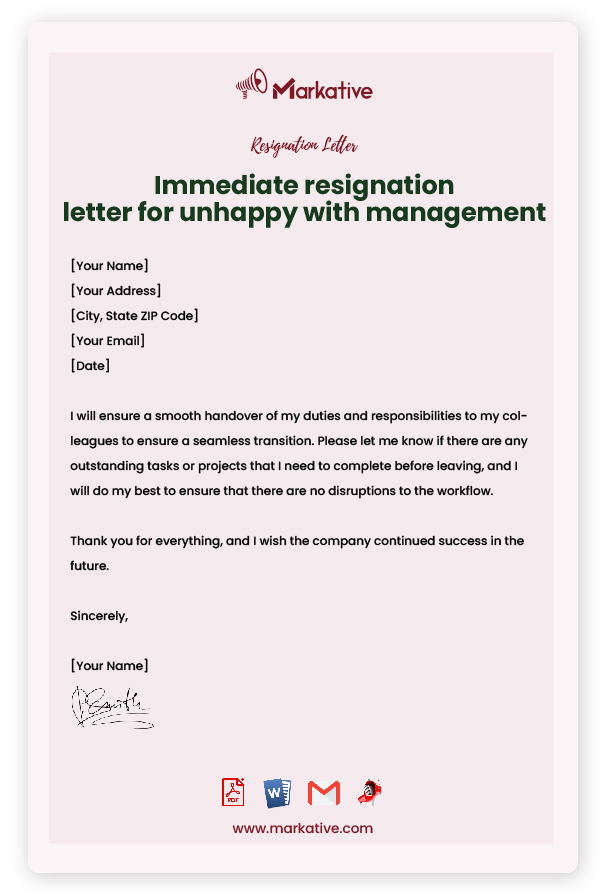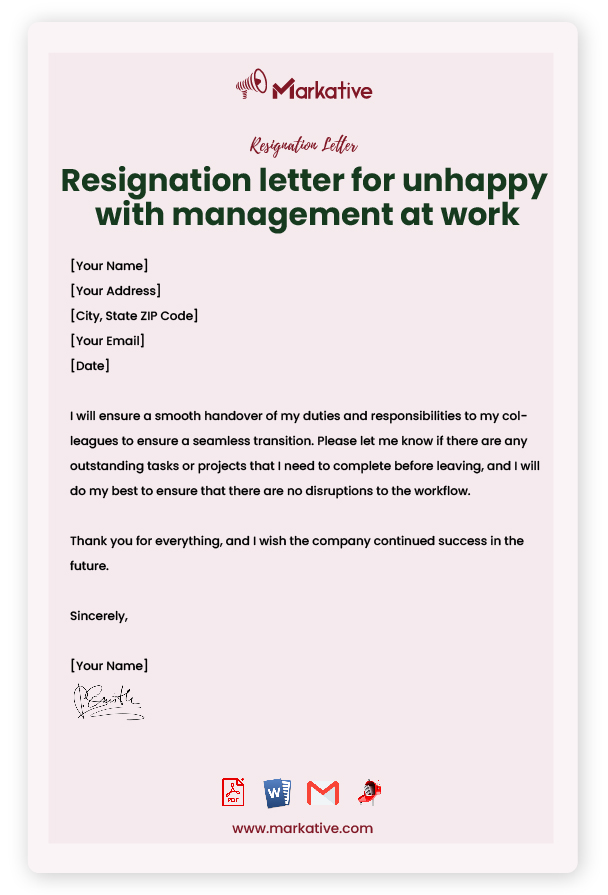In the corporate world, resignation is an inevitable part of professional life. Whether you’re Resignation Letter Unhappy With Management, seeking better opportunities or simply need a break, resignation letters are crucial in formalizing your departure from an organization. A resignation letter not only serves as a formal announcement of your departure, but it also documents your exit for future reference. Therefore, writing a good resignation letter is crucial to ensure a smooth and professional exit from the company.
A good resignation letter can have a significant impact on your professional career. It demonstrates your professionalism, helps maintain positive relationships with your colleagues, and keeps the door open for future opportunities. On the other hand, a poorly written resignation letter can hurt your reputation and damage relationships, making it difficult to find new job opportunities. Therefore, it is important to craft a well-written and thoughtful resignation letter that reflects your professionalism and positive attitude.
If you are unsure of how to write a resignation letter or need guidance on how to handle a difficult situation, this article is for you. In this article, we will discuss the importance of a resignation letter, how a good resignation letter can create a positive impact, and provide tips on how to write an effective letter when you are unhappy with management. Whether you are resigning due to a toxic work environment or simply seeking better opportunities, this article will provide you with the information you need to make a professional exit and ensure a positive outcome for your future career.
How To Write Appealing Resignation Letter Unhappy With Management?
Writing a resignation letter can be challenging, especially when you are unhappy with management. However, a well-crafted resignation letter can leave a positive impression and maintain professional relationships.
Five steps to write an appealing resignation letter when unhappy with management:
- Start with a clear statement of your intention to resign. Example: “Please accept this letter as formal notice of my resignation from the position of Sales Manager, effective two weeks from today.”
- Express your gratitude towards the company and your colleagues. Example: “I want to thank you and the company for the opportunities provided to me during my time here. I am grateful for the experience gained and the relationships built with my colleagues.”
- State your reasons for leaving and the challenges you faced, but avoid being negative or critical. Example: “However, I have decided to resign due to personal reasons that make it difficult for me to continue in this role. While I have enjoyed working here, I have encountered some challenges that have affected my motivation and productivity.”
- Offer to assist with the transition and provide contact information for follow-up. Example: “I am committed to ensuring a smooth transition and am willing to assist in any way possible during my remaining time here. Please feel free to contact me at [phone number or email address] for any follow-up.”
- End on a positive note and wish the company success in the future. Example: “I wish the company and my colleagues continued success and growth. Thank you again for the opportunities and experiences gained during my time here.”
Conclusion: Writing an appealing resignation letter when unhappy with management can be challenging, but it is important to remain professional and positive. By following these steps and providing examples, you can craft a well-written and thoughtful resignation letter that leaves a positive impression.

Immediate Resignation Letter Unhappy With Management
Dear [Manager's Name], I am writing to inform you that I am resigning from my position effective immediately. Unfortunately, I can no longer continue working for this company under the current management. My decision to leave has been a difficult one, but the constant lack of support, communication, and direction from management has made my time here unbearable. I have expressed my concerns numerous times, but they have gone unaddressed, and the situation has not improved. I value the experience I have gained during my time here and appreciate the opportunities provided to me. However, it is time for me to move on to a more supportive and positive work environment. I will ensure a smooth transition for my replacement and will do everything in my power to complete any outstanding work to the best of my abilities. Thank you for the time and effort invested in me during my tenure here. Sincerely, [Your Name]
For More: How To Write a Resignation Letter Due to Poor Management [5+ Templates]
Sample Resignation Letter Unhappy With Management
Dear [Manager's Name], I am writing to inform you of my resignation from my position as [Your Position] at [Company Name]. My last day of work will be [Date]. After much reflection, I have decided that it is time for me to move on from this company. While I have enjoyed my time here, I have become increasingly unhappy with the management of the company. Over the past few months, I have witnessed a lack of leadership and poor decision-making that has resulted in decreased morale and productivity among the employees. Despite my efforts to address these issues with you and other members of management, I have seen little improvement in the overall management of the company. As a result, I have come to the difficult decision that it is best for me to resign. I want to thank you for the opportunities that you have provided me during my time at [Company Name]. I have learned a great deal and have had the pleasure of working with many talented individuals. I am grateful for the experiences and knowledge that I have gained. I will do everything I can to ensure a smooth transition during my remaining time at the company. Please let me know how I can assist in the transition process. Thank you again for everything. Sincerely, [Your Name]
Professional Resignation Letter Unhappy With Management
Dear [Manager's Name], I am writing to inform you of my resignation from my position as [Your Position] at [Company Name]. My last day of work will be [Date]. While I have enjoyed my time at [Company Name], recent events have led me to the decision to resign. Specifically, I have become increasingly unhappy with the management style of the company, which I feel does not align with my personal and professional values. I believe that the company would benefit from a different approach to management, one that fosters open communication, collaboration, and mutual respect. I want to thank you and the rest of the team for the opportunities that have been afforded to me during my time here. I have learned a lot, and I am grateful for the experience. I will do everything I can to ensure a smooth transition during my remaining time here and assist in any way possible. Please let me know if there is anything else you need from me during this time. Thank you for your understanding and support. Sincerely, [Your Name]
Resignation Letter Unhappy With Management with Notice Period
Dear [Manager's Name], I am writing to inform you that I am resigning from my position as [Your Position] at [Company Name], effective [Date of Resignation], which is [Notice Period] days from today. Unfortunately, I have come to the difficult decision to resign due to my unhappiness with the management at this company. I have given this decision a lot of thought and consideration, but I believe that it is in my best interest to pursue other opportunities elsewhere. I would like to express my gratitude for the opportunities and experiences that I have had while working at [Company Name]. I have learned a lot and grown both personally and professionally during my time here. I would also like to thank my colleagues for their support and for making my time here enjoyable. During the remainder of my time at the company, I will do everything in my power to ensure a smooth transition for my replacement. I am committed to fulfilling my duties and responsibilities to the best of my ability until my last day of work. Thank you for your understanding and for everything you have done for me during my tenure at [Company Name]. Sincerely, [Your Name]
Resignation Letter Unhappy With Management without Notice Period
Dear [Manager's Name], I am writing to inform you of my resignation from my position as [Your Position] at [Company Name], effective immediately. I understand that this may come as a surprise, but after careful consideration, I have decided that this is the best course of action for me. I have been increasingly unhappy with the management style of the company, which has had a significant impact on my job satisfaction and overall well-being. Despite my best efforts to communicate my concerns, I have not seen any meaningful changes, and I no longer feel that I can continue to work in this environment. I apologize for any inconvenience that this may cause the company, and I assure you that I will do everything in my power to ensure a smooth transition. I will make myself available to assist with any necessary handover procedures and to provide any information that may be required to ensure the continued success of the company. I understand that my decision not to provide a notice period may cause some disruption, and I apologize for any inconvenience this may cause. However, given the circumstances, I believe that this is the best course of action for both myself and the company. Thank you for the opportunity to work with [Company Name]. I have learned a lot during my time here and will always be grateful for the experiences and skills that I have gained. Sincerely, [Your Name]
How Much Notice Should You Give for a Resignation Letter Unhappy With Management?
According to a survey conducted by the Society for Human Resource Management, the average turnover rate in the United States in 2021 was 19.3%. Additionally, a study by the Work Institute found that one in three employees will leave their job within the first six months of employment. The cost of employee turnover can be high for employers, with estimates ranging from 16% to 213% of the employee’s salary.
If you are unhappy with management and have decided to resign, it is important to give adequate notice. The general rule of thumb is to provide at least two weeks’ notice, although this can vary depending on your industry and the company’s policies. Giving sufficient notice can help ensure a smoother transition for your employer and colleagues. It also allows you to maintain a positive relationship with your employer, which may be important for future job references or networking opportunities. If you have a contract or agreement with your employer that specifies a different notice period, be sure to comply with those terms.

Is it Ok To Email a Resignation Letter Unhappy With Management?
While it is possible to email a resignation letter expressing dissatisfaction with management, it is generally recommended to have a face-to-face conversation with your manager or HR representative before submitting the letter. This allows for the opportunity to discuss any issues and potentially find a resolution, rather than burning bridges and potentially damaging professional relationships. However, if you have already attempted to address the issues with management and feel that emailing a resignation letter is the best course of action, be sure to remain professional and avoid expressing overly negative or emotional language. For example:
Dear [Manager], It is with regret that I am submitting my resignation from [company]. While I have enjoyed my time working here, I have come to the difficult decision that it is time for me to move on. I would like to express my disappointment with the management style and the lack of support I have received during my tenure. Despite my efforts to address these concerns, they have not been adequately resolved. I appreciate the opportunities that have been given to me and I wish the company and my colleagues all the best in the future. Sincerely, [Your Name]
Common Mistakes When Writing a Resignation Letter Unhappy With Management?
- Being overly emotional: While it’s understandable to feel upset or frustrated when resigning due to management issues, it’s important to keep your resignation letter professional and avoid venting your emotions in the letter.
- Being vague: It’s important to clearly state the reasons why you’re resigning, specifically citing issues with management if that’s the reason. Avoid being too general or ambiguous as it may lead to misunderstandings or confusion.
- Burning bridges: While you may be leaving the company due to management issues, it’s important to maintain a professional tone and avoid any negative comments or criticisms of specific individuals. It’s always best to keep things polite and positive to preserve professional relationships and potentially positive references in the future.
For More: How To Write Resignation letter for personal reasons [5 Free Samples]
Conclusion:
Writing a resignation letter can be a challenging task, especially if you’re unhappy with your management. It’s essential to approach the situation with professionalism and clarity to avoid any misunderstandings or conflicts. When writing a resignation letter, it’s important to choose the right timing and place to deliver the message.
Sending the letter in person or via email to your supervisor and HR representative is appropriate. Common mistakes to avoid when writing a resignation letter include being emotional, sharing too many details, and burning bridges with the company or colleagues.
By using a template, you can ensure that your resignation letter is well-structured, concise, and professional. We have provided multiple free and ready-to-use templates that you can choose from, depending on your situation and preference. Remember that a well-crafted resignation letter can help you maintain positive relationships with your employer and colleagues and leave a good impression.







